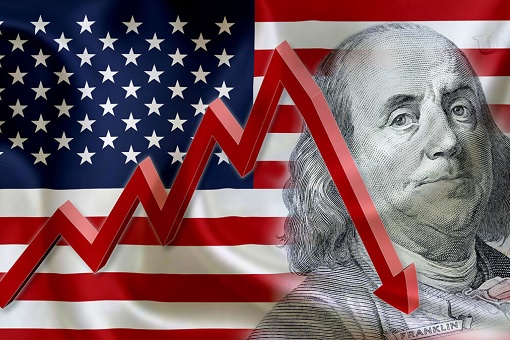Japan’s Nikkei lost a staggering 4,451 points on Monday (August 5) – the biggest drop in history. That’s more than 12%, dragging the country’s stock market losses to 25% since early July. The biggest one-day drop means the index is entering the bear market. It instantly brings back the memory of “Black Monday” in October 1987, when the Nikkei lost 3,836 points and the global markets plunged.
It was so bad that the Japanese – even South Korean – stock markets triggered circuit breakers “multiple times”, where trading was suspended for a period of time to prevent panic selling. The bloodbath and panic spread to other markets in Europe and Asia. It started when the Bank of Japan, in an attempt to contain inflation, raised its key interest rate last Wednesday to about 0.25% from a range of zero to about 0.1%.
While the move was to arrest the Japanese Yen’s slide against the U.S. dollar, it also hurts an export-dependent economy that imports almost all its oil, as well as other items such as food and raw materials. It was the second time this year that Japan raised interest rates. Just 4 months ago, the central bank raised its key rate above zero for the first time in 17 years. And more rate hikes may be coming this year.

As the fourth-largest economy in the world behind the U.S., China and Germany, a stronger yen, while could fight inflation, would certainly hurt its exports and economy. It was already bad that Japan’s economy is shrinking – contracting 1.8% in the first quarter of this year. Slow wage growth, pricier imports, weakening currency and sluggish consumer spending have been some of the problems dragging Japan’s economy.
Private consumption, which accounts for around half of Japan’s real gross domestic product (GDP), declined for four consecutive quarters through the January-March period. Now, the surprise rate hike couple with low private spending could spark economic stagnation. As the Bank of Japan continues to raise interest rates, the U.S. Federal Reserve seems on course to cut rates in September.
On the same day the Japanese stock market experienced a panic sell-off, brilliant analysts and economists in the U.S. told everyone not to panic. But the Dow Jones lost more than 1,000 points as the stocks plunged for a third consecutive day. Even before the U.S. markets opened on Monday, the “Magnificent Seven” – Apple, Amazon, Nvidia, Tesla, Microsoft, Meta, and Alphabet – lost US$1 trillion in market value.

Thanks to Japan and the U.S., the global markets lost a jaw-dropping US$6.4 trillion in a massive panic selloff on Monday, and this could be just the beginning. Questions are being asked if the party is over, leading to a mad rush to buy safe U.S. Treasury bonds. Over the weekend, Goldman Sachs warned about an increased risk of recession in a report to their clients.
Yes, the biggest problem is the fear that the world’s largest economy is heading for a recession after last Friday’s weaker-than-expected U.S. jobs report and non-farm payrolls figure for July, which sent the S&P 500 tumbling into the weekend. Investors are extremely concerned that the Fed may have left it too late to try to support the American economy.
While the good news is that the U.S. may start cutting interest rates next month (September), it’s too little too late – the damage has been done. For a year, the U.S. Federal Reserve has maintained benchmark borrowing costs at a 23-year peak of 5.25%-5.50%. The prolonged tight monetary policy might be pushing the economy toward a recession, and the latest jobs report is just one of the indicators.

The unemployment rate, which climbed to 3-year high of 4.3%, has raised alarms about a weakening labour market and the economy’s susceptibility to recession. America added just 114,000 jobs last month, down from 179,000 the previous month. Worse, the jobless rate rose to the highest level since October 2021. Weak factory data also added to concerns of a recession.
A U.S. recession, which could happen early next year (2025), would in turn hurt economies around the world. Despite some analysts rubbishing a recession, there is speculation that the Federal Reserve might cut the interest rates by a full percentage point from just 0.25%. Suddenly, the central bank is trapped – if slashes rate by more than 0.25%, it would be seen as a coming recession.
There are other economic indicators which suggest that the economy isn’t as rosy as senile Joe Biden would like the people to believe, and recession could happen early next year (2025). After more than 191,000 workers at U.S.-based tech companies were retrenched in mass job cuts in 2023, the layoffs continue this year as companies in both the U.S. and Canada.

From Tesla and Lucid Motors to Google and Intel, nearly 40% of business leaders surveyed by ResumeBuilder think layoffs are likely at their companies this year. And about half interviewed say their companies are not hiring. Half of the 900 leaders admitted recession as the reason. Nike has prepared US$2 billion as severances, whilst Citigroup will cut 20,000 staff.
Information technology companies have retrenched a whopping 100,000 employees till July 2024 alone, with more in the pipelines. To rub salt into injury, quarterly earnings from the tech stocks have been disappointing. With the exception of Meta, other companies like Amazon, Intel, Microsoft, Alphabet reported revenue miss or horrible numbers, despite heavy investment in AI (artificial intelligence).
But it was not confined to tech sector as the layoffs span various industries, including technology, automotive, financial services, consumer and retail, health, manufacturing, logistics, and natural resources. Even defense contractor Lockheed Martin is planning to cut 1% of its jobs, despite supposedly booming business due to Ukraine War and Israel-Hamas conflict in the Middle East.

It’s a no-brainer why everyone appears to be cutting jobs, or at least not hiring, and reported poor earnings. It is called economic downtrend. After years of happy times, now we have two economies, Japan and the U.S., driving the world to the graveyard. The US$20 trillion “carry trade” that the Government of Japan has been engaging for the past 40 years has burst.
If you are clueless, carry trades refer to the simple trick of making money where an investor borrows in a currency with low interest rates, such as the Japanese yen, and reinvests the proceeds in higher-yielding assets elsewhere. Thanks to 0% rate in Japan and 5.5% rate in the U.S., almost every bank used the popular trading strategy to make easy money in recent years – until the Bank of Japan changed its monetary policy.
When Warren Buffett dumps half of his Apple stock (390 million shares for US$76 billion), it can’t be a good sign. Either the legendary investor believes a recession is coming or Apple, which has made him a lot of money, won’t be able to continue making more money for Buffett’s Berkshire Hathaway. This isn’t merely about profit-taking. He sees something that we don’t.

The Oracle of Omaha did not need to cut Apple by half if he believes the current bloodbath is nothing but a storm in a teacup. After all, Berkshire’s cash pile was at record US$277 billion on June 30. Buffett does not need the extra US$76 billion cash from ditching the Apple shares. Unless he sees the markets will become worse, and he can use the cash from the sale of Apple shares to go bargain hunting.
Even bitcoin, and the entire crypto universe is crashing. Bitcoin saw its worst price crash since 2022, falling more than 10% on Monday to below US$50,000 for the first time since February. Other leading cryptocurrencies – Ethereum (ETH), Binance Coin (BNB), Cardano (ADA) and Solana (SOL) all plunged by around 15%. The crypto market lost US$510 billion in market value since August 2.
The third factor is China. While Japan is tearing itself apart with interest rate hikes and the U.S. is heading for a hard landing, the Middle Kingdom won’t be able to rescue the U.S. this round. Not many people realize how China bailed the world out of the last three recessions – the 1997-98 Asian Financial Crisis, the 2000-02 dot-com Bust and the 2008-09 Global Recession.

In each case, China’s extraordinary economic growth that grew at a double-digit level had acted as the catalyst to restart the global economy cylinders through huge stimulus. But those booming times were over as past stimulus measures have left China with a mountain of debt. The Chinese economy grew just 4.7% in the three months to June 2024. It is not planning additional stimulus this year.
Other Articles That May Interest You …
- Record 13% Pay Hike For Civil Servants – Get Ready For Subsidy Cuts, Skyrocketing Inflation And Even Recession
- A Nasty Recession Is Coming – Here Are Signs That Economic Problems Are Getting Worse
- Putin Gets The Last Laugh – Germany Enters Recession After Europe Powerhouse Screwed Its Own Economic Engine
- Inflation To Escalate And Recession To Begin – All Hell Will Break Loose After Ukraine’s Defeat In Bakhmut
- Signs Of Global Recession – Walmart & Major Retailers Cancel Billions Of Dollars Of Orders Despite Christmas Holiday
- The Worst Is Not Over Yet – Why Inflation & Recession Are Still Alive And The Global Economy Is Still In Bad Shape
- Recession Inevitable – Federal Reserve May Slap 0.75% Rate Hike To Trigger A Recession To Try Fix Its Own Screw-Up
- Economic & Financial Meltdown Is Here – All Signs Lead To Recession, Stagflation, Jobless And A Repeat Of Dot-Com Bust
- From Cheap Money To Ukraine War – How The U.S. Screws Up Its Inflation, And Scrambles To Prevent A Global Recession
- Underwear Index, Lipstick Index, Skyscraper Index – These Recession Indicators Show A Recession Is Coming

|
|
August 6th, 2024 by financetwitter
|


|

|

|

|

|

|




























Comments
Add your comment now.
Leave a Reply